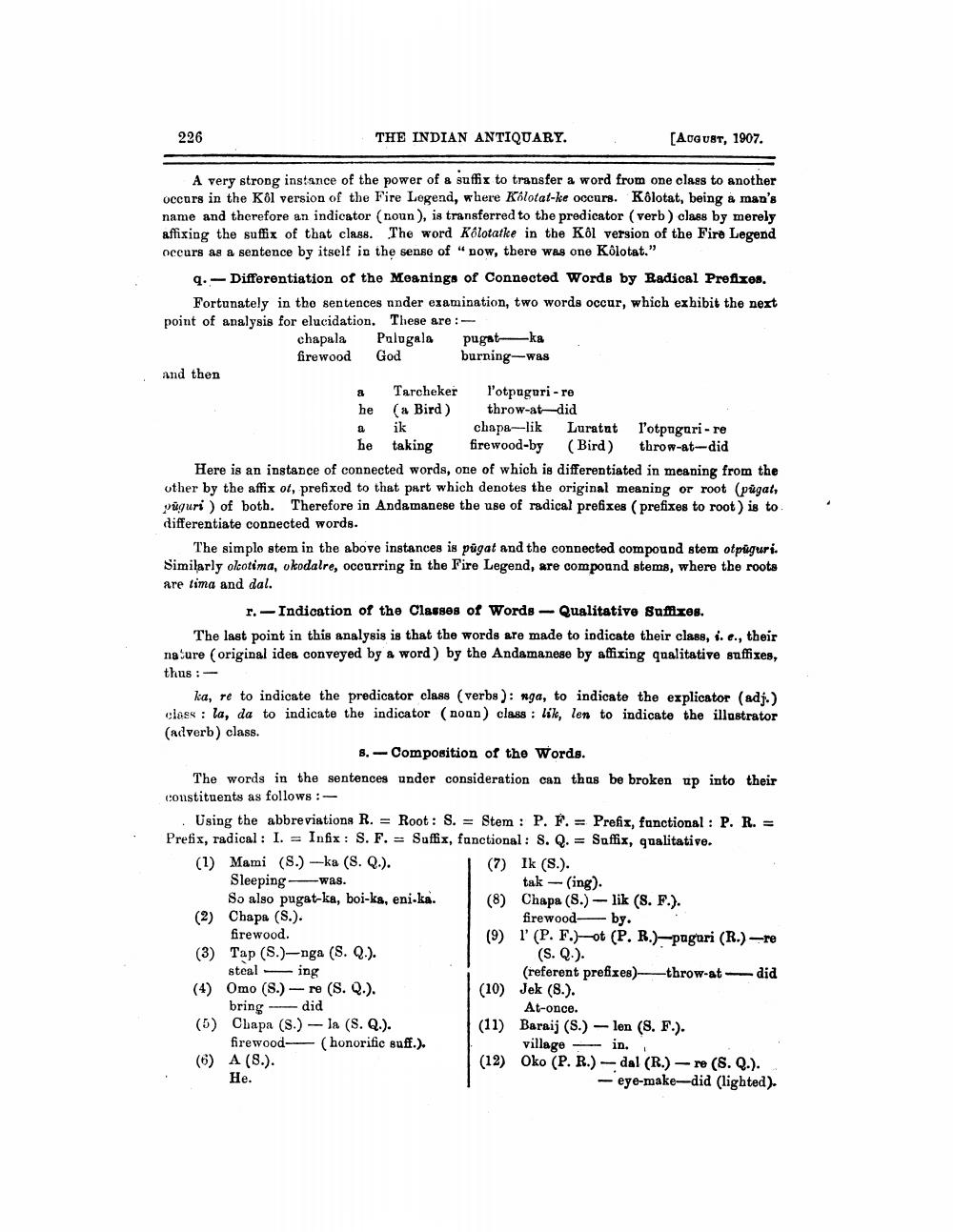________________
226
THE INDIAN ANTIQUARY.
[AUGUST, 1907.
A very strong instance of the power of & suffix to transfer a word from one class to another occurs in the Kol version of the Fire Legend, where Kolotat-ke occurs. Kôlotat, being a man's name and therefore an indicator (noun), is transferred to the predicator ( verb ) class by merely affixing the suffix of that class. The word Kolotatke in the Kol version of the Fire Legend occurs as a sentence by itself in the sense of " now, there was one Kolotat."
q.- Differentiation of the Meanings of Connected Words by Radical Prefizes.
Fortunately in the sentences under examination, two words occur, which exhibit the next point of analysis for elucidation. These are:
chapala Palugala pugatka
firewood God burning-was and then
& Tarchekerl'otpaguri - re he (a Bird) throw-at-did a ik
chapa-lik Luratat l'otpuguri-re
he taking firewood-by (Bird) throw-at-did Here is an instance of connected words, one of which is differentiated in meaning from the other by the affix ot, prefixod to that part which denotes the original meaning or root (pūgat, yuguri ) of both. Therefore in Andamanese the use of radical prefixes (prefixes to root) is to differentiate connected words.
The simple stem in the above instances is pūgat and the connected compound stem otpuguri. Similarly olcotima, o kodalre, occurring in the Fire Legend, are compound stems, where the roots are lima and dal.
r.-Indication of the Classes of Words - Qualitative Suffixes. The last point in this analysis is that the words are made to indicate their class, i. e., their nature (original idea conveyed by a word) by the Andamanese by affixing qualitative suffixes, thus :
ka, re to indicate the predicator class (verbs): nga, to indicate the explicator (adj.) class : la, da to indicate the indicator (noun) class : lik, len to indicate the illustrator (adverb) class.
8.- Composition of the Words. The words in the sentences under consideration can thus be broken up into their constituents as follows:
Using the abbreviations R. = Root: S. = Stem : P. F. = Prefix, functional: P. R. = Prefix, radical: I. = Infix: S. F. = Suffix, fanctional: S. Q. = Saffix, qualitative. (1) Mami (S.) -ka (S. Q.).
(7) Ik (S.). Sleeping was.
tak - (ing). So also pugat-ka, boi-ka, eni ka. (8) Chapa (S.) - lik (S. F.). Chapa (S.).
firewood- by. firewood.
(9) l'(P. F.)-ot (P. R.)-paguri (R.) -re (3) Tap (S.)-nga (S. Q.).
(S. Q.). stealing
(referent prefixes)— throw-at- did (4) Omo (S.) - re (S. Q.).
(10) Jek (8.). bring --- did
At-once. (5) Chapa (s.) – la (S. Q.).
Baraij (S.) - len (8. F.). firewood- (honorific suff.).
village —-in. (6) A (8.).
Oko (P. R.) - dal (R.) - re (S. Q.). He.
-eye-make--did (lighted).




